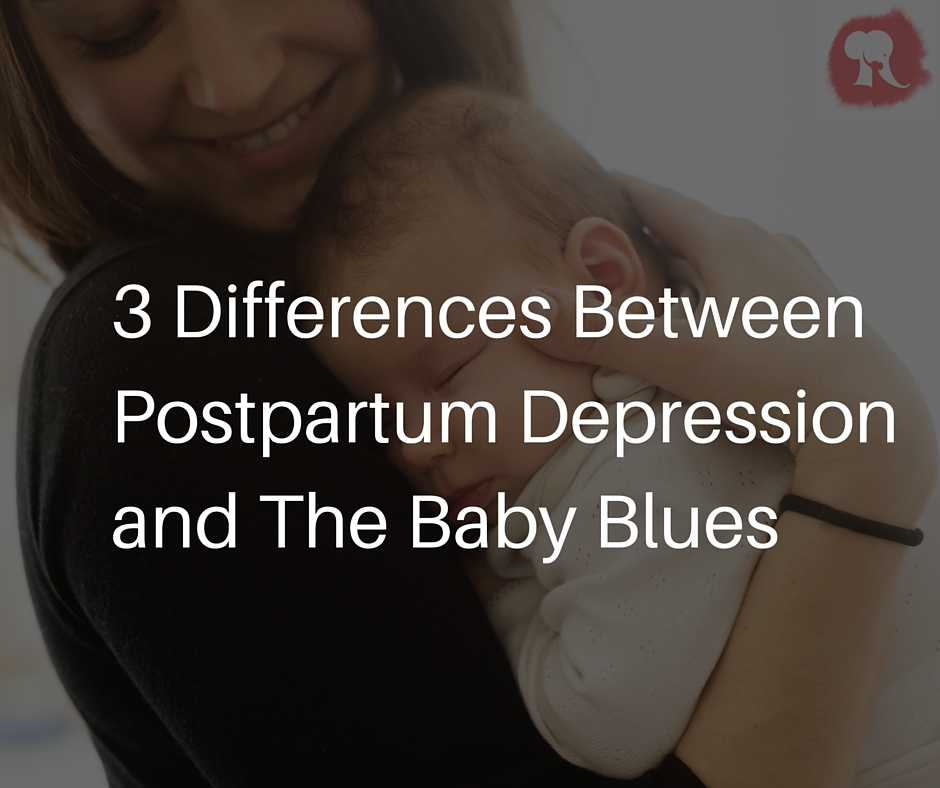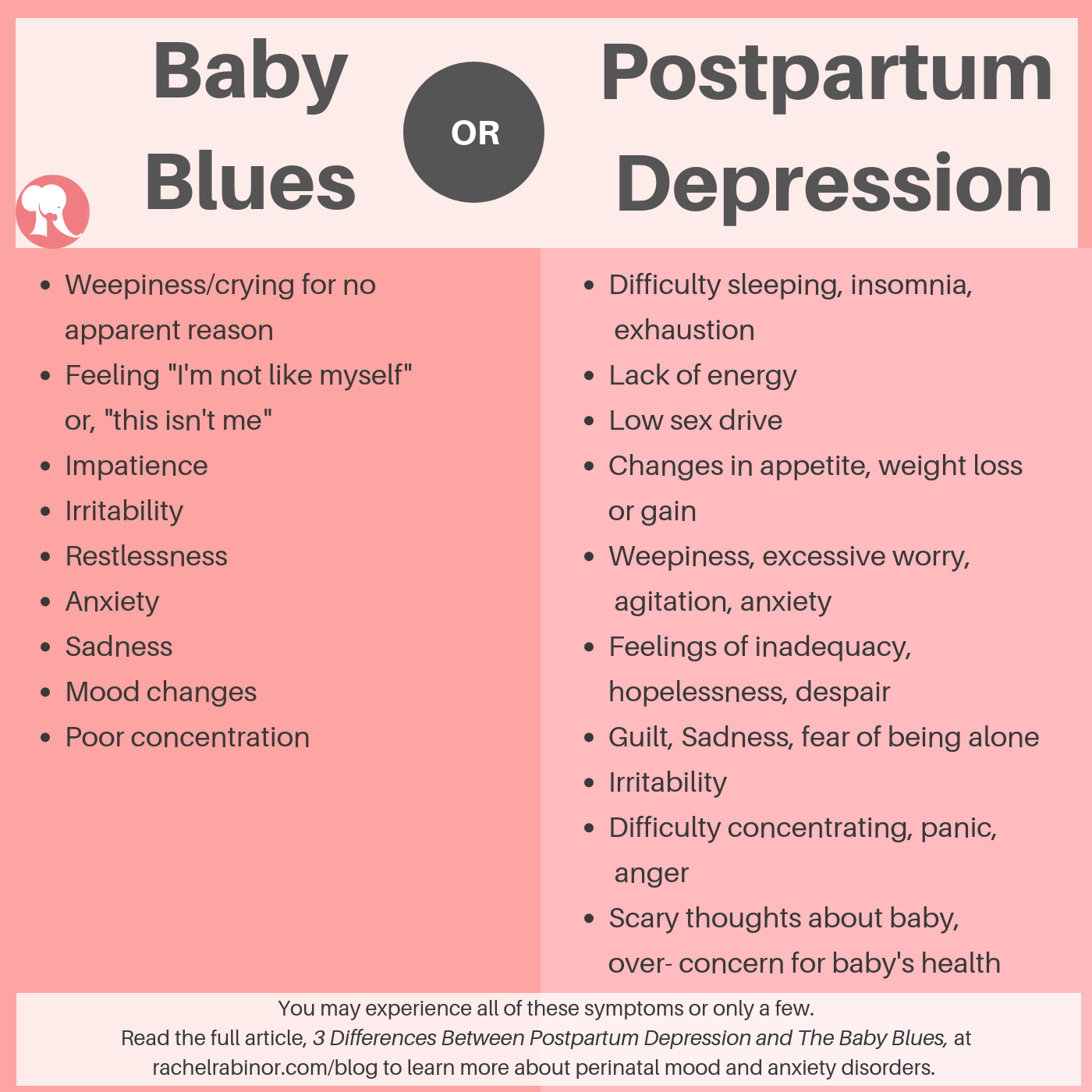3 Differences Between Postpartum Depression and The Baby Blues
People often confuse the Baby Blues and Postpartum Depression. Some like to say that all moms have a bit of postpartum. Have you heard that? When I hear that I presume they're not sure what the difference is between the Baby Blues, which are normal mood fluctuations after having a baby, and something more serious like Postpartum Depression or Postpartum Anxiety.
People often confuse the Baby Blues and Postpartum Depression. Some like to say that all moms have a bit of "postpartum". Have you heard that? When I hear that I presume they're not sure what the difference is between the Baby Blues, which are normal mood fluctuations after having a baby, and something more serious like Postpartum Depression or Postpartum Anxiety (and then there's the very important fact that "postpartum" is actually a period of time, not a condition).
For the purpose of this post, I want to clarify that PPD and PPA are NOT the only mental health concerns during pregnancy or postpartum. They fall under the umbrella of Perinatal Mood and Anxiety Disorders (PMAD), but I wouldn't have caught your attention with that title now, right?
Are there visual cues to detecting Postpartum Depression?
It's not only regular folks who are confused about the differences, but some medical professionals are also a bit unclear. I've heard that some some professionals specializing in women's health don't formally screen for perinatal mood or anxiety disorders because they feel they can tell whether a mom is struggling with PPD just by looking at her. Is it possible, you wonder?
Here's a quick quiz: below are two images of postpartum women. Which woman has the Baby Blues? Which has Postpartum Depression? If you're struggling with Postpartum Depression right now, or have in the past you know better than to fall for this one: you don't have to be sad and teary to be diagnosed with a PMAD. In fact, many women make an enormous effort to look put together. If this sounds like you, you're definitely not alone.
Image A
image b
The Face of the Baby Blues
The massive hormonal shift immediately after birthing a baby will more likely have you looking like the image on the left, "Image A" than the one on the right, "Image B". A shocker for many despite the fact that the Baby Blues affects up to 80% of mothers and as I said earlier, are due to a normal fluctuation of hormones.
Danielle Haines, on the left (Image A), is a doula and midwife in-training. She posted this raw image of herself on Facebook a few months ago. It was taken days after giving birth to her son, and she shared it in an effort to shed light on what the adjustment to early motherhood really looks like. Sadly, there's still stigma attached to this normal postpartum experience. Women are unfortunately hesitant to share that motherhood isn't all ice cream and roses.
The Face of Postpartum Depression
The image on the right, of course, is Hayden Panettiere. She looks like so many new moms--walking on the beach, seemingly happy with her baby and fiancé. No visual cues that she is suffering. This is also how many women who are suffering survive, by projecting a put-together image of themselves, avoiding the shame and stigma that still persists. Meanwhile they're falling apart on the inside. Alone. Because they "look fine" no one pays attention. They slip through the cracks. Up to 20% of women experience a Perinatal Mood or Anxiety Disorder.
When this photograph of Panettiere was captured her baby was three months old. She sought treatment for postpartum depression seven months(!) after that image was publicized. Fortunately, times are changing and celebrities like Hayden Panettiere are more open about their real-life experiences adjusting to early motherhood. Thankfully there is a growing effort to destigmatize PMADs, and to motivate others to get the help they need.
Symptoms of Postpartum Depression vs the Baby Blues
So if we (doctors included) can't tell by looking, how can we know if what we're feeling is part of the normal adjustment to early motherhood or something more serious? Below is a cheat sheet describing the different symptoms one may experience with either the Baby Blues or Postpartum Depression. You may notice some similarities. Keep reading below to better understand the differences.
It's not necessarily what you are feeling. It's how often you feel it, how long you have been feeling this way, and how much it impedes your functioning.
1-Duration
How long have you been feeling this way? The baby blues typically resolves within 2-3 weeks after giving birth, whereas Postpartum Depression symptoms continue for longer, and may present several weeks or months after having a new baby (*or bringing one home-- PPD impacts adoptive parents as well as fathers/non birthing parents).
2- Intensity
How much are these feelings interfering with your life? If you're not sure how to evaluate intensity, answer these questions:
Do I find it hard to care for my own basic needs or those of my baby or other children? Is my eating or sleeping affected by these feelings?
Are these feelings interfering with other important relationships? With my partner? Other family members? Friends? Work?
3-Frequency
How often are you feeling this way? Once a week? Once a day? Nonstop? There's a difference.
It's important to recognize that some of the most common symptoms of postpartum depression-- rage and anxiety for example-- look nothing like the stereotypical image of a saddened, depressed woman who can't get out of bed. Symptoms of the Baby Blues respond extremely well to rest and other forms of self-care. Here's an article that outlines 6 Ways to Improve your Postpartum Self-Care.
Getting help for Postpartum Depression
If you've been struggling with distressing thoughts and feelings for longer than two weeks, I recommend that you reach out to your doctor or a psychotherapist who specializes in perinatal mood and anxiety disorders.
And if it's less than two weeks but you just "know" something's not right, pay attention to that inner voice. Trust that you know yourself best and reach out for help. It really doesn't matter what we call it; you and your baby both deserve the care and attention you need to thrive. It's also important to reiterate that Postpartum Depression as referred to in this article, falls under the umbrella of perinatal mood and anxiety disorders, PMADs, which encompass other illnesses such as postpartum obsessive compulsive disorder, postpartum anxiety, postpartum post-traumatic stress disorder and postpartum psychosis.
If you or someone you know is struggling with a Perinatal Mood or Anxiety Disorder, please reach out for support. PMADs are very treatable. In my private practice in San Diego, California where I specialize in Maternal Mental Health, I offer a free 30 minute in-person consultation to find out if I'm the right therapist for you. Postpartum Support International (PSI) is a national organization that maintains a warmline and a list of trained providers specializing in Maternal Mental Health. If you’re in San Diego, CA, The Postpartum Health Alliance is our local chapter of PSI and a wonderful resource.
How to Find a Therapist in San Diego
In San Diego, we’re lucky to have so many mental health practitioners. If only everyone in all corners of the globe were as fortunate as we are; choice is certainly a luxury. But having so many choices can also make it a challenge to find a counselor when you need one most. Typically you find yourself searching for a therapist when things aren't going so well, when you really need that extra bit of support. And with so many possibilities, you’re probably wondering— how do I choose!? Where do I start?
In San Diego, we’re lucky to have so many mental health practitioners. If only everyone in all corners of the globe were as fortunate as we are; choice is certainly a luxury. But having so many choices can also make it a challenge to find a counselor when you need one most. Typically you find yourself searching for a therapist when things aren't going so well, when you really need that extra bit of support. And with so many possibilities, you’re probably wondering— how do I choose!? Where do I start?
Below are a few recommendations for finding a counselor that’s right for you. There are many many qualified and capable therapists here in San Diego, the task is to find someone for YOU. The good news is that with so many options there’s bound to be someone who you can connect with and confide in. It will take some work on your end, but it will be well worth it!
Let's start with the logistics of finding a counselor in San Diego:
- Define your needs. Think about what you need from a therapist. Concretely– someone close to home, work, evening hours, morning hours, takes insurance, doesn't; has experience working with postpartum issues, infertility, anxiety, depression, parenting concerns…
- Look to your friends. When I need an ENT, a dentist, a car mechanic, I ask my friends for suggestions. Likewise, when I'm searching for a therapist for myself I also see if one of my besties has someone to recommend. But sometimes you're dealing with an issue that your friends haven't dealt with, or you're just not comfortable asking around. In that case, move on to my next suggestion.
- Head to the internet. Psychology Today is probably the most popular website with nationwide provider listings along with a smattering of everything for your psychological mind. Mental health providers post their info and you, the consumer can peruse at your leisure. There are a variety of filters you can activate to find someone who fits your search criteria. For example, if finding someone who’s close to your home is important, you can plug in your zip code and narrow down your choices instantly. You can also filter by gender, specialty, language... You get the idea. Another good place to search for a therapist is through specific associations that support the issue you’re struggling with. So if you want someone who’s experienced with infertility, for example, you will probably stumble across Resolve, which is the National Infertility Association. So even a national organization can point you to a local therapist through their provider listings.
- More internet research. So once you have some names, regardless of whether it came from a friend, Psychology Today, or Resolve, now's the time to learn more and review their website. You can read the “About” and Specialty pages, and look over the FAQs to get a feel for the counselor and see if he or she might be a good fit for you.
- Making Contact. Once you have 3 or 4 therapists that you’d like to get to know more, start making calls and sending emails. Many therapists in San Diego offer a free 15 – 20 minute phone consultation. It’s a great opportunity to ask questions and get a sense of whether this person may be able to help you before scheduling that first appointment.
- Meeting your therapist. You might want to schedule a couple of in-person appointments before deciding on a therapist. This is a great opportunity to ask more questions. Remember, you are interviewing this person to see if you want to hire them. Yes, you are hiring your therapist to help you through a difficult time, explore a specific issue, help manage challenging behaviors, etc. Pay attention to how patient they are with the process and your questions. How do you know you'll be able to work with someone? That is such a personal and individual thing– and a lot of it depends on knowing yourself and trusting your gut.
It is widely believed that the therapeutic relationship between you and your therapist is the most important factor in successfully resolving your presenting issue. The therapeutic relationship is the collaborative relationship between client and therapist, entirely focused on the client, to gain understanding of and effectively change the client in a way that supports their overall well-being.
The ability of the therapist to facilitate a strong working therapeutic relationship is everything. Theoretical orientation may be of interest to you, but as far as resolving the issue that brought you to therapy, it’s the counselor's innate abilities that matter most.
Below are some things to consider during your initial phone consultation and throughout the initial sessions of therapy to determine if someone might be a good therapist for you:
- Do you feel the therapist is genuinely engaged with you, focused on your well-being and motivated to help guide you? Does he or she remember to follow up or discuss topics further that you feel require more attention?
- Are you comfortable with the therapist? Are you able to share personal information and express yourself emotionally? Do you feel the conversation is insightful? Do you feel you can trust the therapist? Can you comfortably express your concerns and doubts with the counselor or is there some fear of judgment?
- Do you find the therapist comforting, empathic, and compassionate? Is he or she responsive to your emotional and verbal expressions? Are they cold when working with you?
These are just a few important aspects within the therapeutic process to pay attention to when trying to find a new therapist in San Diego. Hopefully you're feeling ready now to begin your search.
If you’re wondering if I'm a good match for you, call me for a free 20 minute phone consultation.








